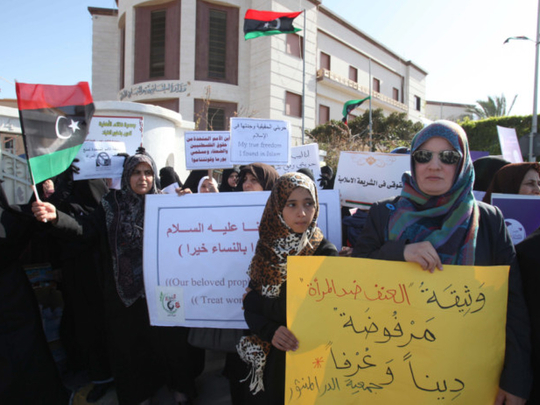
United Nations: A dozen human rights and women’s organizations from the Arab world expressed alarm on Thursday at the opposition by some Arab governments to a strong UN statement on combatting violence against women.
Egypt proposed an amendment last week saying that each country is sovereign and can implement the document in accordance with its own laws and customs — a provision strongly opposed by many countries in Europe, Latin America and Asia.
The nongovernmental organisations accused Arab governments of increasingly using arguments based on religion, culture, tradition or nationality to justify violence particularly targeted at women.
They urged governments “to clearly denounce all practices which perpetuate violence against women and girls, including those which are justified on the basis of tradition, culture and religion, and work on eliminating them.”
Their statement was issued as negotiators tried to reach agreement on the text of a final statement before a meeting of the UN Commission on the Status of Women ends Friday.
Francoise Girard, executive director of the New York-based International Women’s Health Coalition, a nonprofit organization which promotes the reproductive and sexual rights of women and young people, told The Associated Press that a range of issues in the text are still unresolved, including Egypt’s proposed amendment.
“We’re coming down to the wire,” she said.
On Wednesday, Egypt’s Muslim Brotherhood sharply criticised the anticipated UN document, saying it was “deceitful,” clashed with Islamic principles and undermined family values.
According to the Brotherhood, which has emerged as the most powerful political faction in Egypt since the 2011 uprising, the draft under discussion advocates sexual freedoms for women and the right to abortion “under the guise of sexual and reproductive rights.” It also decried the document’s defence of homosexual rights, which are not recognised in Islam, and the equating between children born in and out of wedlock.
The Brotherhood, which won Egypt’s presidency and controls parliament, called on other Muslim nations, women’s groups and Islamic organisations to reject the document. It called it an infringement on the thought, culture and uniqueness of Islamic societies.
The Brotherhood urged women’s rights groups not to be “lured by phony calls for civilised behaviour and by misleading and destructive processes.”
Libya’s top cleric also raised similar concerns, rejecting the document for violating Islamic teachings.
In response, the statement from the Arab Caucus — including NGOs from Egypt, Tunisia, Jordan, Lebanon and Palestine as well as The Coalition for Sexual and Bodily Rights in Muslim Societies — underlined that “the taboos and politicisation of issues around sexuality are major hindrances to gender justice and the elimination and prevention of violence against women and girls in our countries.”
A separate statement Thursday from nearly 300 organisations and several dozen individuals from around the world also strongly demanded that all governments and the international community “reject any attempt to invoke traditional values or morals to infringe upon human rights guaranteed by international law, nor to limit their scope.”
It said customs, tradition or religious considerations “must not be tolerated to justify discrimination and violence against women and girls.”












